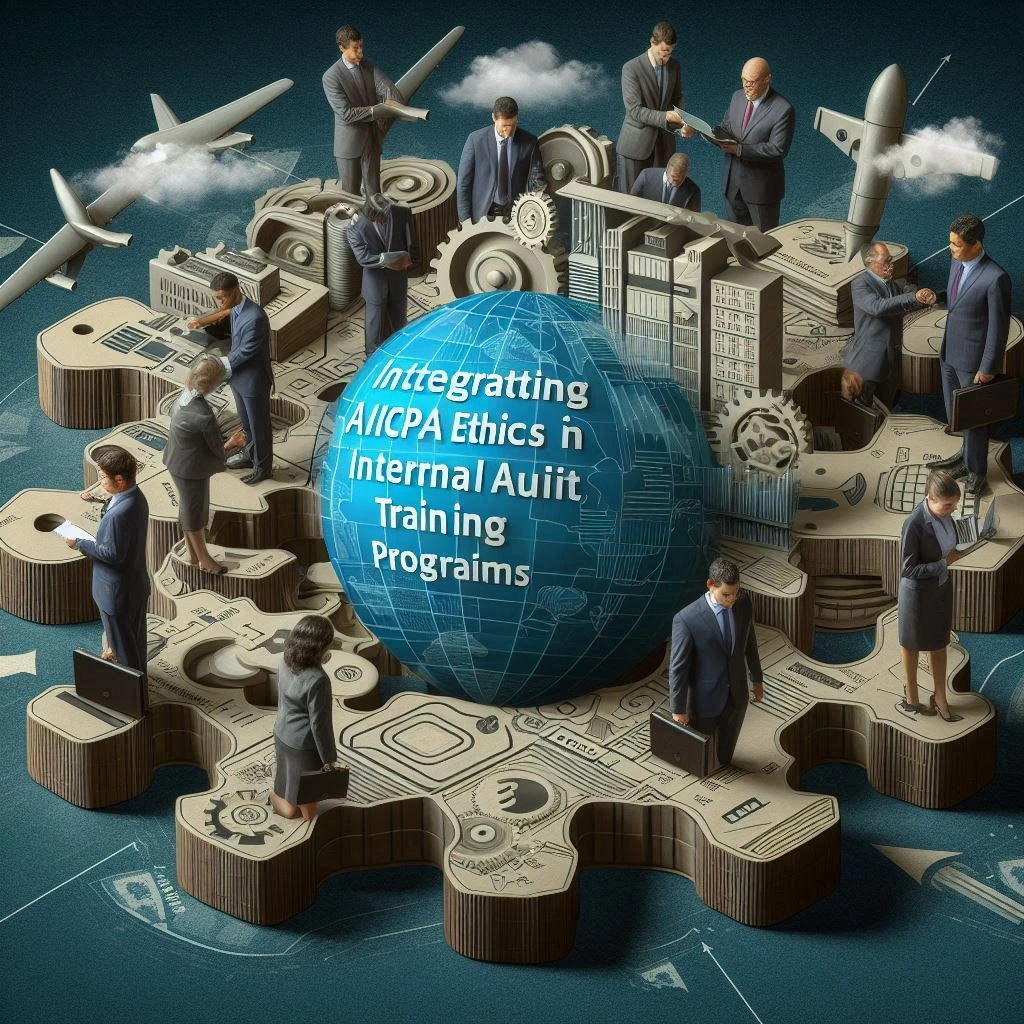In the realm of internal auditing, the integration of ethical standards is paramount to maintaining the integrity and trustworthiness of the profession. The American Institute of Certified Public Accountants (AICPA) plays a crucial role in establishing these ethical standards, which serve as a guiding framework for auditors. This section aims to provide training and development managers in audit firms with a foundational understanding of AICPA ethics, emphasizing best practices for embedding these principles into internal audit training programs.
The AICPA is a leading organization in the accounting profession, responsible for developing and enforcing ethical standards that govern the conduct of Certified Public Accountants (CPAs). The AICPA Code of Professional Conduct is a comprehensive document that outlines the ethical responsibilities of CPAs, ensuring that they adhere to principles of integrity, objectivity, professional competence, confidentiality, and professional behavior. This code is not only applicable to traditional accounting practices but also extends to internal auditing, where ethical considerations are critical in fostering transparency and accountability within organizations [5][11].
Ethics in internal auditing is essential for several reasons:
- Trust and Credibility: Internal auditors are often seen as the guardians of an organization’s integrity. Upholding high ethical standards enhances the credibility of the audit function and builds trust among stakeholders, including management and the board of directors.
- Risk Mitigation: Ethical lapses can lead to significant risks, including financial misstatements and reputational damage. By embedding ethics into training programs, audit firms can better prepare their teams to identify and address ethical dilemmas proactively.
- Regulatory Compliance: Adhering to AICPA ethics helps ensure compliance with various regulations, including the Sarbanes-Oxley Act, which emphasizes the importance of ethical conduct in financial reporting and internal controls [3][4].
The AICPA Code of Professional Conduct is built upon several key ethical principles that are particularly relevant to internal auditors:
- Integrity: Auditors must be honest and forthright in all professional and business relationships. This principle is foundational to maintaining the trust of stakeholders.
- Objectivity: Internal auditors should remain impartial and free from conflicts of interest, ensuring that their judgments are not influenced by personal interests or relationships.
- Professional Competence: Continuous professional development is essential. Auditors are required to maintain their knowledge and skills to provide competent services, which includes staying updated on the latest developments in auditing practices [4].
- Confidentiality: Internal auditors must respect the confidentiality of information acquired during the course of their work and should not disclose such information without proper authority, unless legally obligated to do so.
- Professional Behavior: Auditors are expected to comply with relevant laws and regulations and avoid any conduct that discredits the profession [5][6].
By understanding and integrating these ethical principles into internal audit training programs, training and development managers can foster a culture of ethics that not only enhances the effectiveness of the audit function but also contributes to the overall integrity of the organization.
The Importance of Ethics in Internal Audit
Integrating ethics into internal audit training programs is crucial for fostering a culture of integrity and accountability within organizations. The American Institute of Certified Public Accountants (AICPA) provides a framework that emphasizes the importance of ethical behavior in the auditing profession. Here are some key points to consider regarding the significance of ethics in internal audit practices:
- Influence on Audit Quality and Credibility: Ethical behavior is foundational to the quality and credibility of audit work. Auditors who adhere to ethical principles such as integrity, objectivity, and due care are more likely to produce reliable and trustworthy audit results. This adherence not only enhances the auditor’s reputation but also strengthens stakeholder confidence in the audit process and the organization as a whole [3][5].
- Consequences of Unethical Behavior: Unethical conduct in auditing can lead to severe repercussions, including financial losses, legal penalties, and damage to an organization’s reputation. For instance, instances of fraud or misrepresentation can undermine the entire audit process, leading to misguided decisions based on inaccurate information. Furthermore, unethical behavior can erode trust among clients and stakeholders, which is essential for the long-term success of any audit firm [9].
Embedding AICPA ethics into internal audit training programs is not just a regulatory requirement but a best practice that enhances audit quality, protects the organization, and fosters a culture of ethical behavior. Training and development managers in audit firms should prioritize the integration of ethical principles into their programs to ensure that auditors are equipped to handle the complexities of their roles with integrity and professionalism.
Current Trends in Ethics Training for Internal Auditors
In the evolving landscape of internal auditing, the integration of ethics training, particularly aligned with the American Institute of Certified Public Accountants (AICPA) standards, has become increasingly vital. Training and development managers in audit firms are tasked with embedding these ethical principles into their programs to foster a culture of integrity and accountability. Here are some key trends and best practices in ethics training for internal auditors:
Overview of Current Training Programs Focusing on AICPA Ethics
- Mandatory Ethics Training: Most organizations require auditors to complete a minimum of two hours of ethics training as part of their Continuing Professional Education (CPE) requirements. This training is designed to ensure that auditors are well-versed in the ethical implications of their work and the AICPA’s Code of Professional Conduct [1][3].
- Ethics Course Objectives: The primary goal of ethics courses for Certified Internal Auditors is to promote an ethical culture within the profession. These courses often cover the AICPA’s ethical standards and the importance of maintaining independence and objectivity in auditing practices [14].
Trends in Ethics Training Methodologies
- Interactive Workshops: There is a growing trend towards interactive workshops that engage participants in real-world ethical dilemmas. These sessions encourage auditors to discuss and navigate complex ethical situations, enhancing their decision-making skills.
- E-Learning Platforms: The rise of e-learning has transformed how ethics training is delivered. Online courses provide flexibility and accessibility, allowing auditors to complete training at their own pace while still covering essential AICPA ethical standards.
- Case Studies and Current Trends: Training programs are increasingly incorporating case studies that reflect recent ethical challenges faced by the profession. This approach not only makes the training relevant but also helps auditors apply theoretical knowledge to practical scenarios [12].
The Role of Technology in Enhancing Ethics Training
- Digital Tools and Resources: Technology plays a crucial role in enhancing ethics training. Online resources, such as the AICPA Online Ethics Library, provide auditors with easy access to the Code of Professional Conduct and other ethical guidelines [3][4].
- Simulations and Scenarios: Advanced training programs are utilizing simulations and scenario-based learning to immerse auditors in ethical decision-making processes. These tools help auditors practice their responses to ethical dilemmas in a controlled environment, thereby improving their readiness for real-life situations [12][14].
- Continuous Learning and Development: The integration of technology facilitates ongoing learning opportunities, allowing auditors to stay updated on the latest ethical standards and practices. Continuous professional development is essential for maintaining a strong ethical foundation within the internal audit function [12][15].
As the internal audit profession continues to evolve, embedding AICPA ethics into training programs is essential for fostering an ethical culture. By adopting contemporary training methodologies and leveraging technology, audit firms can ensure their auditors are well-equipped to navigate the complexities of ethical decision-making in their roles.
Best Practices for Embedding AICPA Ethics into Training Programs
Integrating AICPA ethics into internal audit training programs is essential for fostering a culture of integrity and accountability within audit firms. Here are some actionable strategies for training and development managers to effectively incorporate these ethical principles into their curriculum:
- Integrating Ethical Dilemmas and Case Studies: Incorporating real-world ethical dilemmas and case studies into training modules can provide auditors with practical insights into the complexities of ethical decision-making. This approach not only enhances understanding but also encourages critical thinking about how to apply AICPA ethics in various scenarios. By analyzing past cases where ethical breaches occurred, trainees can learn to recognize potential pitfalls and develop strategies to avoid similar situations in their practice.
- Encouraging Open Discussions About Ethics in Auditing: Creating a safe environment for open discussions about ethics is crucial. Training sessions should include dedicated time for participants to share their thoughts, experiences, and concerns regarding ethical issues in auditing. This dialogue can help demystify ethical challenges and promote a culture of transparency. Facilitators can guide these discussions by posing thought-provoking questions and encouraging participants to reflect on their values and the implications of their decisions.
- Utilizing Role-Playing and Simulations: Role-playing and simulations are effective tools for reinforcing ethical decision-making. By engaging in simulated scenarios, auditors can practice navigating ethical dilemmas in a controlled setting. This experiential learning approach allows participants to explore the consequences of their choices and understand the importance of adhering to AICPA ethics. Additionally, these activities can help build confidence in handling real-life situations, ultimately leading to more ethical behavior in the workplace.
By implementing these best practices, training and development managers can create a robust framework for embedding AICPA ethics into internal audit training programs. This not only enhances the ethical standards of the auditors but also contributes to the overall integrity of the auditing profession.
Measuring the Effectiveness of Ethics Training
Integrating AICPA ethics into internal audit training programs is essential for fostering a culture of integrity and compliance within audit firms. To ensure that these training programs are effective, it is crucial to measure their impact systematically. Here are some best practices for evaluating the effectiveness of ethics training in internal audit practices:
Key Performance Indicators (KPIs) for Assessing Ethics Training Effectiveness
- Knowledge Retention: Assess participants’ understanding of ethical principles and AICPA standards through pre- and post-training assessments. This can help gauge the increase in knowledge and comprehension of ethical guidelines [11].
- Behavioral Changes: Monitor changes in behavior and decision-making processes among auditors post-training. This can be evaluated through observations, peer reviews, and self-assessments to determine if ethical considerations are being integrated into daily practices [10].
- Incident Reporting: Track the number of ethical violations or compliance issues reported before and after training. A decrease in incidents may indicate that the training has positively influenced ethical behavior.
- Employee Engagement: Measure employee engagement and satisfaction with the training program through surveys. High engagement levels can correlate with a greater commitment to ethical practices [15].
- Audit Quality: Evaluate the quality of audits conducted post-training. This can include assessing the thoroughness of audits and adherence to ethical standards, which can be reflected in audit outcomes and client feedback.
Methods for Gathering Feedback from Participants
Surveys and Questionnaires: Distribute surveys immediately after training sessions to gather participants’ feedback on the content, delivery, and relevance of the training. This can provide insights into areas of improvement [4].
Focus Groups: Conduct focus group discussions with participants to delve deeper into their experiences and perceptions of the training. This qualitative feedback can uncover specific challenges and suggestions for enhancement [6].
Follow-Up Interviews: Schedule follow-up interviews with a sample of participants several months after training to assess the long-term impact of the training on their ethical decision-making and practices.
Performance Reviews: Incorporate discussions about ethics training into regular performance reviews. This can help assess how well employees are applying ethical principles in their work and identify any ongoing training needs [10].
Continuous Improvement Based on Evaluation Results
Data Analysis: Regularly analyze the data collected from KPIs and feedback mechanisms to identify trends and areas needing improvement. This analysis should inform adjustments to the training content and delivery methods [5].
Iterative Training Design: Use the insights gained from evaluations to refine and enhance the training program continuously. This may involve updating materials, incorporating new case studies, or adjusting the training format to better engage participants [8].
Benchmarking: Compare the effectiveness of your ethics training program against industry standards or best practices. This can help identify gaps and opportunities for improvement [9].
Stakeholder Involvement: Engage stakeholders, including senior management and audit committee members, in the evaluation process. Their insights can provide valuable perspectives on the training’s relevance and effectiveness.
By implementing these best practices, training and development managers in audit firms can effectively measure the impact of ethics training on internal audit practices, ensuring that auditors are well-equipped to uphold the highest standards of integrity and compliance in their work.
Creating a Culture of Ethics within the Audit Firm
Integrating AICPA ethics into internal audit training programs is essential for fostering a robust ethical culture within audit firms. This section will explore best practices for embedding ethics into audit training, emphasizing the broader organizational context and its significance in internal audit.
Strategies for Fostering an Ethical Culture in the Workplace
Establish Clear Ethical Guidelines: Audit firms should adopt the AICPA Code of Professional Conduct as a foundational document. This code provides a framework for ethical behavior and decision-making, ensuring that all employees understand the standards expected of them [8].
Continuous Professional Development: Ongoing education and training programs are vital for keeping auditors informed about the latest ethical standards and practices. Engaging in professional development opportunities, such as those offered by the AICPA, helps reinforce the importance of ethics in daily operations [6][15].
Integrate Ethics into Audit Processes: Incorporating ethical considerations into every stage of the audit process can help auditors recognize and address ethical dilemmas as they arise. This includes training on the “Conceptual Framework for Independence,” which aids in complying with independence rules [10].
The Role of Leadership in Promoting Ethical Behavior
Model Ethical Behavior: Leadership plays a crucial role in establishing an ethical culture. Leaders should exemplify ethical behavior in their decision-making and interactions, setting a standard for all employees to follow. This modeling of behavior is essential for cultivating trust and integrity within the firm [7].
Communicate the Importance of Ethics: Regular communication from leadership about the significance of ethics in the audit profession can reinforce its importance. This can be achieved through meetings, newsletters, and training sessions that highlight ethical challenges and the firm’s commitment to ethical practices.
Support Ethical Decision-Making: Providing resources and support for ethical decision-making can empower employees to act in accordance with ethical standards. This includes access to ethics hotlines, consultation with ethics officers, and training on how to navigate ethical dilemmas.
Encouraging Whistleblower Policies and Reporting Mechanisms
Implement Whistleblower Protections: Establishing clear whistleblower policies encourages employees to report unethical behavior without fear of retaliation. This is crucial for maintaining an ethical workplace and ensuring that issues are addressed promptly.
Create Accessible Reporting Mechanisms: Audit firms should provide multiple channels for reporting unethical behavior, such as anonymous hotlines or online reporting systems. Ensuring that these mechanisms are easily accessible and well-publicized can increase employee confidence in reporting concerns.
Promote a Speak-Up Culture: Encouraging a culture where employees feel safe to voice their concerns is essential. Training programs should emphasize the value of speaking up and the positive impact it can have on the organization’s ethical climate [1].
Embedding AICPA ethics into internal audit training programs is not just about compliance; it is about creating a culture of ethics that permeates the entire organization. By implementing these strategies, audit firms can foster an environment where ethical behavior is the norm, ultimately enhancing the integrity and effectiveness of their audit processes.
Conclusion
Integrating AICPA ethics into internal audit training programs is not just a regulatory requirement; it is a fundamental aspect of fostering a culture of integrity and accountability within audit firms. The AICPA Code of Professional Conduct serves as a guiding framework that emphasizes the importance of ethical behavior in all professional services, including internal auditing. By embedding these ethical principles into training programs, firms can ensure that their auditors are not only technically proficient but also equipped to navigate the complex ethical dilemmas they may encounter in their work.
Key Takeaways:
- Importance of AICPA Ethics: The AICPA ethics guidelines provide essential insights into best practices and common challenges faced in the auditing profession. They help establish a foundation for quality assurance and ethical conduct, which is crucial for maintaining public trust and professional credibility [1].
- Enhancing Training Programs: Training and development managers are encouraged to actively enhance their internal audit training programs by incorporating AICPA ethical standards. This can be achieved through regular training sessions, workshops, and continuous professional development opportunities that focus on ethical decision-making and compliance [5][14].
- Staying Updated: The landscape of ethical standards is continually evolving. It is vital for training managers to stay informed about the latest updates and interpretations from the AICPA, ensuring that their training content remains relevant and effective. Engaging with resources such as the AICPA Online Ethics Library can provide valuable insights and tools to support this endeavor [10].
In conclusion, the integration of AICPA ethics into internal audit training is a proactive step towards cultivating a robust ethical culture within audit firms. By prioritizing ethics in training, firms not only comply with professional standards but also empower their auditors to act with integrity and professionalism in all their engagements. Training and development managers are urged to take action now to enhance their programs and contribute to the overall integrity of the auditing profession.
Find out more about Shaun Stoltz https://www.shaunstoltz.com/about/
This post was written by an AI and reviewed/edited by a human.



